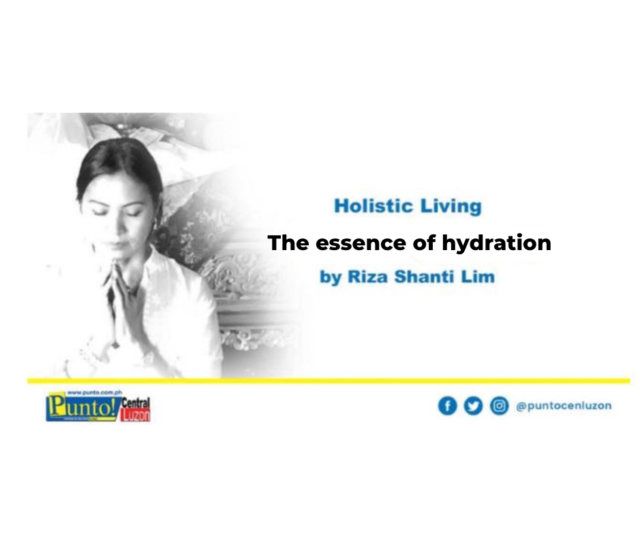AT THE onset of the scorching period, which I felt in the latter part of March, I experienced pulsating headaches and noticed my extremely dry skin. Not sure where it was coming from, I reviewed my past days’ food intake and activities, but I found nothing to connect it to my concern. Up until a friend called complaining about the blazing heat, saying how it made her migraine worse. Thanks to that fateful call, the answer to my dilemma was figured out – dehydration.
Every cell, tissue, and organ in our body needs water to survive and work properly. Just like how the plants and the trees blossom through water, so does our body. Why? Water maintains our body structure temperature, removes wastes and toxins from our system, lubricates the joints, moistens tissues in the eyes, mouth and nose, and the carrier of nutrients and oxygen to the cells. Water is, of no question, essential in our overall health and life.
Dietary specialists’ standard recommendation of water intake is 6 to 8 glasses each day. However, the amount of water needed varies for each person, based on one’s lifestyle and health condition.
While plain water is best for staying hydrated, other drinks and foods can help too. Fruit and vegetable juices, broths, herbal teas, and even caffeinated drink like coffee, add up to your daily water dietary proportion. Although, a moderate amount of caffeine (400 milligrams) isn’t harmful for most people, it is suggested to avoid any caffeinated drinks. Caffeine is a mild diuretic and may cause frequent urination, which can cause dehydration.
Sports drinks can be helpful if you’re planning on exercising at higher than normal levels for more than an hour. They contain carbohydrates and electrolytes that can increase your energy, better water absorption and prevent mineral loss. Be wary, some sports drinks are high in calories from added sugar and may contain high levels of sodium (salt). Check the serving size on the label. One bottle usually contains more than one serving. Energy drinks are not the same as sports drinks. Energy drinks usually contain larger amount of caffeine and high in added sugar. According to doctors, children and teens should not have energy drinks.
If staying hydrated is difficult for you, here are some tips that can help: Keep a bottle of water with you during the day and take a sip every hour or less, even if you are not thirsty, so the body gets used to it; If you don’t like the taste of plain water, try adding a slice of lemon or lime to your drink; Drink water before, during, and after a workout; When you’re feeling hungry, drink water first, thirst is often confused with hunger –– true hunger will not be satisfied by drinking water. Drinking water may also contribute to a healthy weight-loss plan, for drinking water can help you feel full. If you have trouble remembering to drink water, drink on a regular schedule – upon waking up, before breakfast, lunch, dinner, and before bedtime.
Shortage of water in the body causes dehydration, which means your body cannot operate properly, that may lead to fatality. Your urine can be an indicator if you’re dehydrated. If it’s colorless or light yellow, you’re well hydrated. If your urine is a dark yellow or amber color, you may be dehydrated. Other signs thatyou may be dehydrated: Dry mouth; Dry skin; Sleepiness or unexplained fatigue; Extreme thirst; Headache; Confusion; Dizziness or lightheadedness; Constipation; Irritability; Imbalance; Kidney pain; Lack of energy and enthusiasm.
Some are at higher risk of dehydration, including those who exercise at a high intensity, live in a warm or cold weather place, spontaneous lack of sleep, vomiting condition and diarrhea. Older adults are also at higher risk, for the reason of decreased thirst response, decline in retention of fluid, and reduced kidney function.
Note that your body is made up of about 60 percent water, which is more than half of your body weight. You lose water each day when you pee, sweat, exposed to hot or freezing environment, and even when you breathe. Replenishing water each time is as important as breathing.
With all the delightful fruits in season, hydration is more than a pleasure. Eat as much watermelon as you can, to relieve those muscle cramps and to lower blood pressure. Make a shake out of those lovely avocados to brighten your skin and to nourish your digestive system. Blend superb guyabanos that lower inflammation, spasms, pains, and fights cancer. Boil ripe sweet tamarind, remove the seeds and blend to make a super power drink, to enhance your immune system, liver health and nerves’ wellbeing. Savor fresh coconut juice in abundance, the best natural preventive measure, for kidney issues, UTI (urinary tract infection) and a wonderful tonic for a healthy heart.
Namaste.





